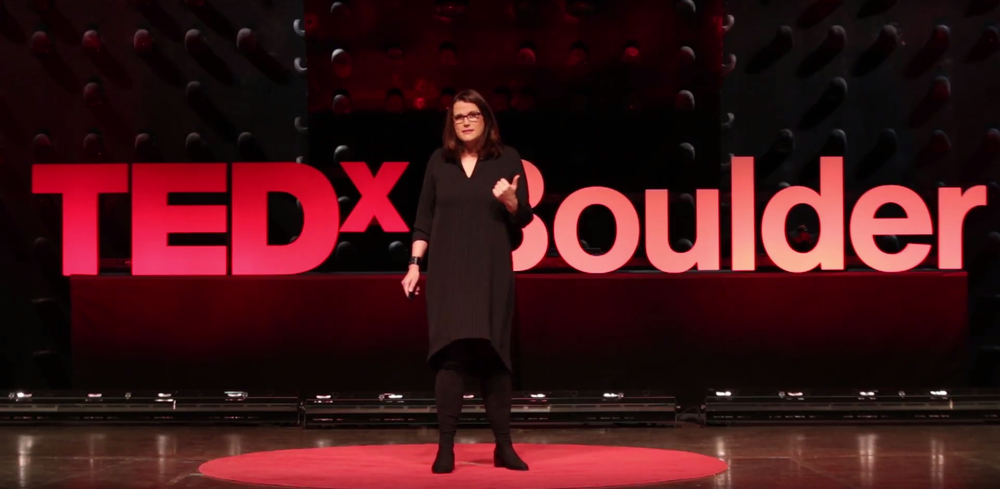How Rx Opioids Helped Me Work Again
By Kate Nicholson, Guest Columnist
I recently told 2,200 intimate listeners during a TED Talk how a surgical error left me in severe pain, unable to sit or stand, and largely bedridden for almost twenty years.
I also explained that with appropriate pain management, including treatment with opioids, I continued working as a high-level federal civil rights prosecutor despite my physical limitations. I won important arguments in federal court, arguing from a folding lawn chair. I drafted the current regulations under the Americans with Disabilities Act (ADA), coordinated with the White House, and supervised thousands of cases by hundreds of attorneys across the country from a computer screen and well-camouflaged bed.
And when my pain finally improved, I stopped taking opioids.
A part of me was not eager to go public as someone who used opioids, for the same reasons that I was initially reluctant to take opioids for pain. Opioids carry a stigma, one that is only increasing today in an era of opioid abuse.
The increase in prosecutions and the oversight of physicians, and the difficulty people in pain today experience in getting appropriate pain medication motivated me to tell my story.

My story of pain began 23 years ago. I was working at my desk in the Civil Rights Division of the U.S. Justice Department, putting the finishing touches on a document due to court, when my back started to burn. It felt like acid eating my spine. My muscles seized and threw me from my chair. As I curled on the floor, my body seared with pain.
Over the coming days and weeks, the pain only intensified. Any postural compression on my spine caused electrical and burning sensations to escalate like an alarm that grows louder and louder.
At the age of 30, just a few years out of Harvard law school, I could barely stand and sitting was impossible. So, I began to conduct my life lying down. For a while, I was able to commute, lying across the backseat of a car to work from a futon on the floor of my office, using a walker to get from place to place. Then for many, many years, I was entirely bedridden.
Two things allowed me to maintain a life under these circumstances. The first is that I happened to be working in one of the few jobs that would accommodate me. When my pain began, I was enforcing the ADA, a civil rights law that protects the rights of individuals with everything from multiple sclerosis to cancer to HIV disease.
The second and more critical factor was my access to good medical care. My pain began in the 1990s, when the pendulum on pain swung decidedly in the opposite direction of where it is today. I had access to the best doctors and to treatment at a pain management clinic. My physicians tried all sorts of treatments, from lidocaine infusions and directed injections, to nerve ablations and a surgery to separate nerves from adhesions. Nothing restored my mobility or diminished the pain.
Early on, I refused to take opioids. I was worried about addiction and stigma. When my doctors initially approached me about taking opioids for pain, I was, at first, devastated. I felt like they were giving up, that I was being put out to pasture. But I had exhausted my available treatment options, so I relented and underwent psychological screening to determine if opioids were appropriate.
As soon as I took opioids, I improved. I wasn’t foggy or especially euphoric. In fact, the opposite happened, space opened in my mind and I could work again. I also never developed a tolerance, requiring more medication for the same level of pain relief.
Opioids did not heal me. Integrative treatment over a long period of time did. But opioids gave me a life until I could find my way to healing. Importantly, they allowed me to continue to work.
I understand that opioids are complicated. People are different. I also recognize that as a public health matter, the interests of treatment must be balanced against the potential for abuse. But today we have no such balance: our media attention and public policy focus singularly on abuse.
Serious physical pain needs to figure into the conversation, especially since severe or persistent pain affects 25 times more Americans than opioid abuse.
I worry that we are throwing out the baby with the bath water. By focusing on a single substance, we are not addressing the root causes of addiction. By placing undue pressure on physicians and the doctor-patient relationship we abandon people in severe pain, many of whom could contribute and lead productive lives, to their suffering.

Kate Nicholson lives in Colorado. She served in the Civil Rights Division of the U.S. Department of Justice for more than 20 years, practicing health-related civil rights law and securing powerful victories including in the U.S. Supreme Court.
Kate is currently writing a book about her personal experiences with severe chronic pain. She can be reached through her website at www.katemnicholson.com.